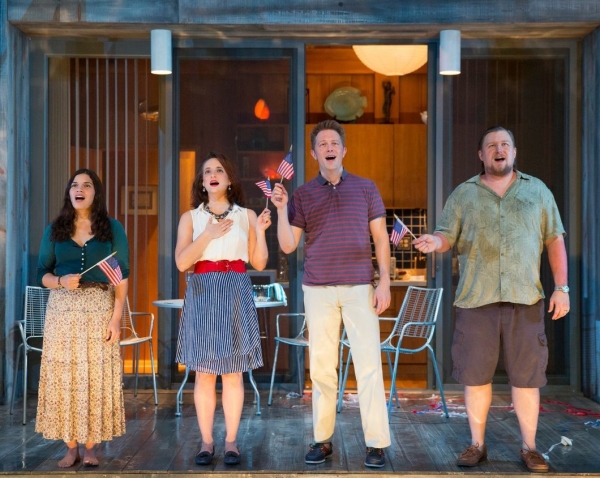Lips Together, Teeth Apart

(© Joan Marcus)
The best thing to come out of Second Stage Theatre's revival of Lips Together, Teeth Apart is the vision of Tracee Chimo as Miss Adelaide in the musical Guys and Dolls. In Terrence McNally's AIDS-themed drama, Chimo is Chloe, a Connecticut housewife whose single respite from domesticity is to work with a community-theater group. The hysterical vision of her practicing the kooky choreography for "Bushel and a Peck" along with tape-recorded piano chords is one of the few things this mostly miscast production, directed by Peter DuBois, actually gets right.
Lips Together, which premiered in 1991, centers on a pair of fortysomething heterosexual couples: blue-collar Sam Truman (Michael Chernus) and his artist wife, Sally (America Ferrera), and the wealthier John Haddock (Austin Lysy), a prep-school admissions director, who's married to Sam's sister Chloe. The Haddocks are visiting the Trumans for July Fourth weekend at the Fire Island beach house that Sally inherited from her brother David, who died from an AIDS-related illness before the action begins. The weekend is rife with conflict. Both marriages are in the process of crumbling, there's knowledge of extramarital affairs, and everyone is afraid to go in the crystalline pool (part of Alexander Dodge's massive, believable beachfront set) out of fear they might get infected.
Ultimately, Lips Together is an allegory about culpability and helping people in need rather than turning a blind eye to a situation like a plague systematically killing an entire community (one of the major recurring moments is Sally believing she sees someone drowning in the drink). Yet there's an extremely dated quality to the text, and nothing about the wafer-thin story or its ugly, abrasive characters can justify a three-act, two-intermission format. In a decade that has brought us brilliant reinventions of Angels in America and The Normal Heart, an AIDS play centering on the infidelities of straight people is passé when works like William M. Hoffman's As Is and even McNally's own Love! Valour! Compassion! are crying out for revivals that would likely have a far greater impact on the current theatrical and sociopolitical landscape.
Costumed in summer-chic outfits by ESosa, the cast members never escape the nagging feeling that they're 20 years too young for these roles. DuBois' vague, hesitant direction does nothing to help them in that respect., and there's a level of shared discomfort this cast can't shake. As the wealthy John, Lysy doesn't plumb the depths of his inner demons as far as he can. Ferrera is required to be the emotional center, though the warmth is in limited supply in her strangely icy performance. Chernus, heavyset and shadowed with shaggy facial hair, is probably the least miscast, having done blue-collar so well before (Orange Is the New Black and The Aliens), but the actor is never once at ease with spitting out Sam's zingers and homophobic quips.
Which leaves Chimo, whose mouth starts running from the second the lights come up. It's a typically assured performance from this eternal chameleon, one that screams, "I know I'm not an ideal fit but I'm going to give it my all." If she was backed by cast members who shared the same mantra, maybe the production would have seemed more surefooted. The ride is still worth it for the image of this versatile performer as Miss Adelaide.










